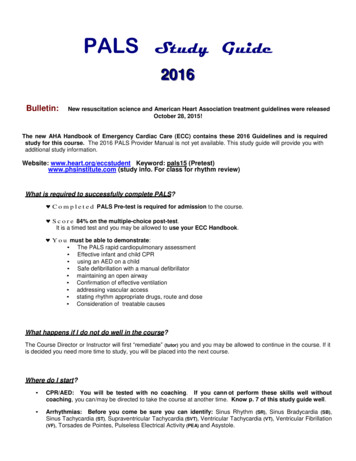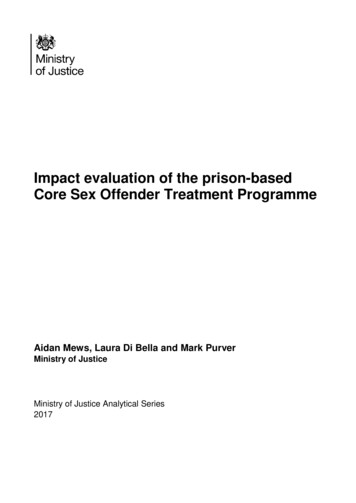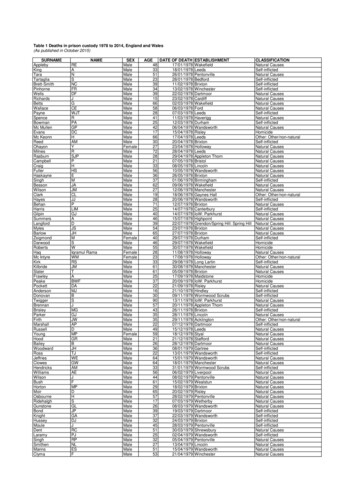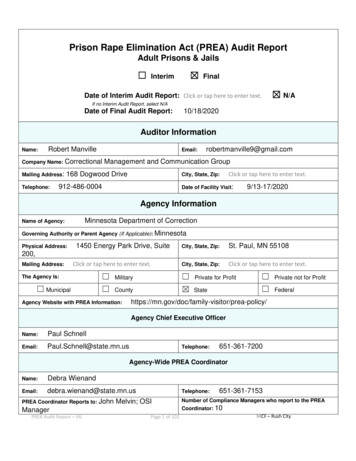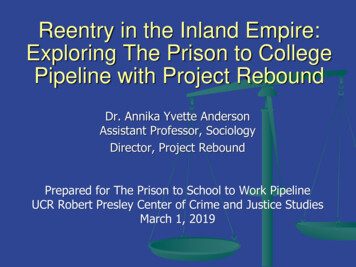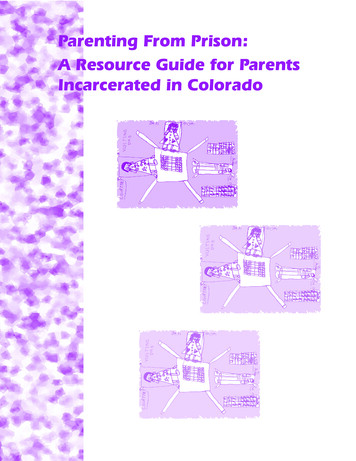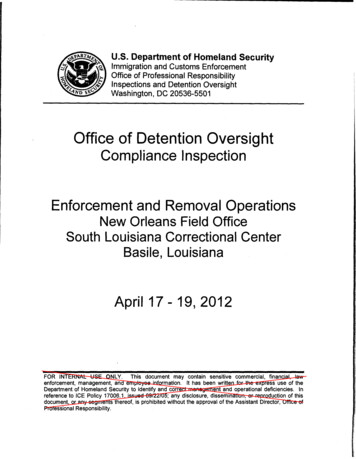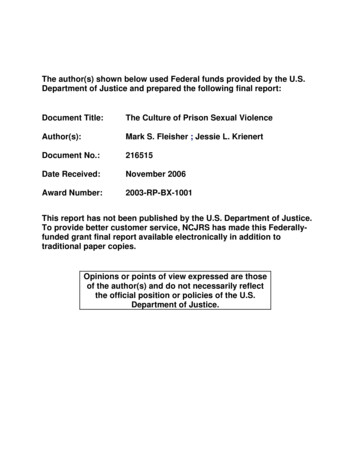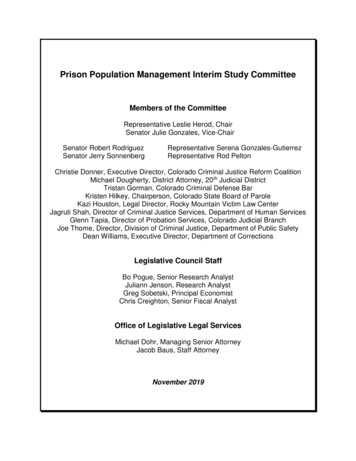
Transcription
Prison Population Management Interim Study CommitteeMembers of the CommitteeRepresentative Leslie Herod, ChairSenator Julie Gonzales, Vice-ChairSenator Robert RodriguezSenator Jerry SonnenbergRepresentative Serena Gonzales-GutierrezRepresentative Rod PeltonChristie Donner, Executive Director, Colorado Criminal Justice Reform CoalitionMichael Dougherty, District Attorney, 20th Judicial DistrictTristan Gorman, Colorado Criminal Defense BarKristen Hilkey, Chairperson, Colorado State Board of ParoleKazi Houston, Legal Director, Rocky Mountain Victim Law CenterJagruti Shah, Director of Criminal Justice Services, Department of Human ServicesGlenn Tapia, Director of Probation Services, Colorado Judicial BranchJoe Thome, Director, Division of Criminal Justice, Department of Public SafetyDean Williams, Executive Director, Department of CorrectionsLegislative Council StaffBo Pogue, Senior Research AnalystJuliann Jenson, Research AnalystGreg Sobetski, Principal EconomistChris Creighton, Senior Fiscal AnalystOffice of Legislative Legal ServicesMichael Dohr, Managing Senior AttorneyJacob Baus, Staff AttorneyNovember 2019
Prison Population Management Interim Study CommitteeCommittee ChargePursuant to Interim Committee Request Letter 2019-10, the Prison Population Management InterimStudy Committee is charged with studying or monitoring: strategies to safely reduce the prison population and decrease recidivism; andprison population reform legislation passed by the General Assembly.Committee ActivitiesDuring the 2019 interim, the Prison Population Management Interim Study Committee held fivemeetings at the State Capitol. The committee also conducted a tour of select correctional facilities.The following subsections discuss the committee’s activities during the 2019 interim.Prison population forecasts. The Division of Criminal Justice (DCJ) within the Department of PublicSafety, and Legislative Council Staff are both charged with forecasting the state’s prison population.The DCJ prepares two forecasts, one in the winter, and one in the summer that adjusts the previouswinter forecast. Legislative Council Staff prepares a forecast each December and presents it to theGeneral Assembly. Representatives of both entities provided overviews of their respective forecasts.The committee discussed certain factors that drive trends in the prison population, such as criminalfilings, changes in law, parole and probation revocations, actions by the State Board of Parole, andprogramming for offenders.Bill C requires a criminal justice system flow, or operational processes, study and incorporateselements of these forecast discussions, such as references to the difficulties of tracking revocations andcommunication issues between certain agencies.Recidivism. The committee heard from representatives of various agencies on the issue of recidivism.The committee recognized that Colorado’s recidivism rate is higher in comparison to the nationwideaverage, and discussed factors driving the recidivism rate, such as the lack of programming andreentry services for offenders. A reoccurring theme, visited during several of the meeting panels, wasthe impact of behavioral health and substance abuse issues on recidivism, and the need forprogramming to address these issues. With a recent spike in the women offender population, it wasnoted that these programming needs are particularly acute for women offenders.Denver private community corrections contract nonrenewal. In August, the Denver City Councilvoted to not renew contracts with private providers of community corrections services. This actionplaced into doubt the future of the offenders receiving these services. At two of the meetings, thecommittee heard from representatives of both state and Denver agencies on the issues associated withPrison Population Management Interim Study Committee1
the city council vote. Discussions centered around options for placing the offenders served by thecontract providers, and the ability of other agencies and community corrections providers toaccommodate this population. The committee also discussed the decision’s potential impact on stateagencies such as the Department of Corrections.Juvenile justice. Representatives of the American Civil Liberties Union and the First Judicial Districtinitiated a discussion on the use of direct file for juveniles. Direct file allows a prosecutor to filecharges against a juvenile directly in adult criminal court. The committee heard testimony centeringaround the idea that, for some, cognitive abilities are not fully matured until years after reaching theage of majority. These discussions led to the drafting of Bill A, which allows a district court to considertransferring the case of a young adult between the ages of 18 and 25 who has been convicted of certaincrimes to juvenile court.Use of private prisons. Of the 25 prisons housing state-level offenders in Colorado, three are privatelyowned and managed. The differences between private and public prisons wove itself into numerouscommittee discussions, including costs, rehabilitation programming offered, the type of inmateshoused, recidivism rates, and the level of security.The state has relied on private prisons to manage an overflow of inmates since the 1990s. Inconjunction, the committee explored ways in which to better use the vacant Centennial South Campusof the Centennial Correctional Facility (also known as CSP II). Senate Bill 19-259 already allows forthe use of this campus to house offenders should the male prison vacant bed rate dip belowone percent for two consecutive months. Bill B further expands the use of this campus forclose-custody inmates regardless of the vacant bed rate, while requiring the removal of one offenderfrom a private facility for each one housed at CSP II.Facilities tour. On September 30 and October 1, 2019, members of the Prison Population ManagementInterim Study Committee visited correctional facilities in the Canon City area, Buena Vista, Pueblo,and Olney Springs. The tour visited the following facilities: Buena Vista Correctional Complex,Fremont Correctional Facility, the Centennial Correctional Facility, La Vista Women’s CorrectionalFacility, and Crowley County Correctional Facility. Committee members learned first-hand about thekinds of programs and services offered at each facility, and also had the opportunity to talk withoffenders. At the Crowley County facility, a private facility, the tour was joined by commissionersfrom Bent and Crowley Counties. The commissioners discussed the impact of the prison on theircommunities in terms of jobs and the tax base.2Prison Population Management Interim Study Committee
Committee RecommendationsAs a result of committee discussion and deliberation, the Prison Population Management InterimStudy Committee recommends the following three bills for consideration in the 2020 legislativesession. The committee also approved sending one letter to the Department of Corrections (DOC),pursuant to Senate Bill 19-259, regarding managing the prison population.Bill A - Young Adult Criminal Justice Reforms. Bill A enacts measures to improve outcomes foradults between the ages of 18 and 25 in the criminal justice system, as outlined below.Transfers to juvenile court. Bill A creates a new court proceeding in which a district court may considertransferring the case of a young adult convicted of a class 3, 4, 5, or 6 felony to juvenile court if thecourt determines that the transfer is in the best interest of the public or the defendant.Juveniles convicted as adult program. Under current law, the DOC operates a specialized program forinmates sentenced to an adult prison for an offense committed prior to the age of 18. This bill extendsprogram eligibility to offenders convicted of an offense that occurred when they were young adults.Deferred judgment, convictions, and probation violations. The bill allows a young adult with a deferredjudgment who violates the condition of it to continue such judgment if determined beneficial by thecourt. The bill also allows a class 4, 5, or 6 nonviolent felony conviction for a young adult to be vacatedand entered as a misdemeanor upon successful completion of a community-based sentence toprobation or community corrections. Further, the bill prohibits a probation revocation hearing fortechnical probation violations committed by young adults.Young adult sentencing. Bill A requires that nonviolent young adult offenders with no prior convictionsbe sentenced to probation. Further, the bill specifies that a court cannot sentence a young adultoffender to more than 12 years for a single class 3, 4, 5, or 6 felony.Bill B - Prison Population Reduction and Management. Bill B makes the following changes withregard to prison population management:CSP II. Bill B allows DOC to use CSP II to house close custody inmates. However, one inmate mustbe removed from a private prison for each state inmate housed at this facility. This one-for-oneexchange must happen until CSP II reaches full capacity.Private prison use study. The bill requires DOC to study how to end the use of private prisons inColorado by 2025. The study must analyze: the use of alternative facilities and programs;local government, community-based provider, and economic impacts;state-operated facilities and programs and the feasibility of the state obtaining private prisonfacilities; andbest practices and programs for the reintegration of offenders and the resources needed totransition away from private prisons.Prison Population Management Interim Study Committee3
Earned time. Bill B authorizes DOC to more broadly apply earned time credits and allows it forinmates who have shown exemplary leadership through mentoring, community service, anddistinguished actions. Earned time is a credit against an inmate’s sentence for participation in orcompletion of programs or other productive activities.Escape and absconding. Bill B eliminates new criminal charges for escape or attempted escape foroffenders in community corrections or an intensive supervised parole program. The bill also createsa new absconding offense and differentiates it from escape.Bill C - Criminal Justice System Operational Processes Study. Bill C requires the DOC to study howindividuals proceed through the stages of the criminal justice system. The study must analyze theoperational and technological systems and procedures used in criminal proceedings and correctionalfacilities; examine recommendations and best practices implemented in Colorado and other states tocreate more efficient operational and technological systems and procedures; review obstacles; andanalyze the types of metrics and information collected and prepared by criminal justice agencies.Committee Letter 1. The committee approved sending a letter to the DOC, pursuant to Senate Bill19-259, which requires the DOC to consider input from the committee. The letter encourages DOC topursue normalization efforts to reduce recidivism, address the needs of women, provide adequatemental health and substance abuse treatment, and allow for inmates to acquire monetary savings priorto release.4Prison Population Management Interim Study Committee
Christie Donner, Executive Director, Colorado Criminal Justice Reform Coalition Michael Dougherty, District Attorney, 20th Judicial District Tristan Gorman, Colorado Criminal Defense Bar Kristen Hilkey, Ch

